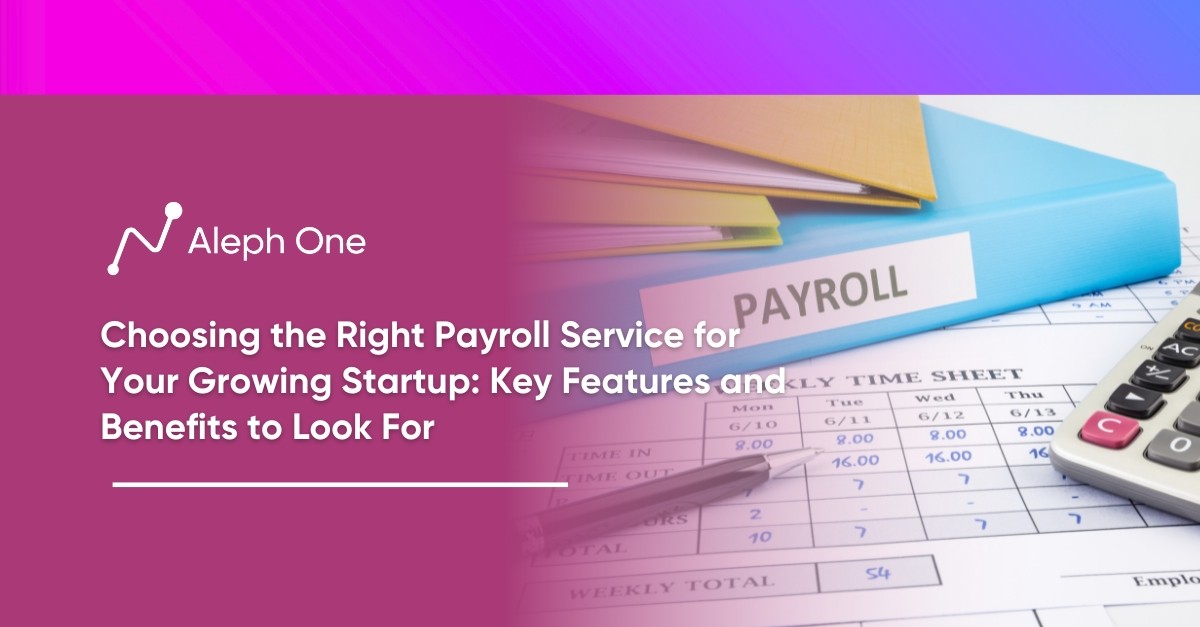Let’s work together to build something amazing. Share your project details and our team will reply to figure out the next steps to your success.

Streamlining financial management is crucial for startups aiming to optimize their resources and focus on core business activities. This article explores the advantages of outsourcing accounting services for startups. By outsourcing, startups can cut costs without compromising quality, as reputable accounting firms maintain high standards through qualified accountants, advanced software, and rigorous review processes. Additionally, startups gain access to a wealth of expertise, including specialized knowledge in tax planning, auditing, and financial reporting. Outsourcing allows startups to scale their accounting needs quickly, adapt to changing demands, and leverage advanced tools and software without upfront investments. By delegating accounting responsibilities to experts, founders can concentrate on strategic decision-making, improve work-life balance, and make better long-term financial choices.

Cut Costs Without Compromising Quality
One of the most significant advantages of outsourcing accounting services for startups is cost savings. Outsourcing can reduce accounting overhead costs by up to 40% compared to hiring in-house staff. In the 1980s, the average salary for an in-house accountant was $50,000 per year. Today, outsourcing provides the same services for around $30,000 per year.
Reinvest in Your Startup
For startups operating on limited capital, these cost savings can be reinvested into other key business areas to drive growth. Startups can allocate more resources to product development, marketing, and sales instead of administrative tasks like accounting. Outsourced accounting also eliminates costs associated with employee benefits, office space, and accounting software for in-house staff.
Outsourcing Does Not Mean Reduced Quality
While outsourcing reduces costs, it does not necessarily mean a compromise in quality. Reputable accounting firms maintain high-quality standards through hiring qualified accountants, ongoing training, and a rigorous review process. They also leverage advanced accounting software and tools to minimize errors and ensure accuracy. Studies show outsourced accounting can decrease errors by up to 23% compared to in-house staff.
Outsourced Accountants Incentivized to Provide High-Quality Work
Outsourced accountants are also incentivized to provide high-quality work to maintain a good reputation and client relationships. They aim to build long-term partnerships with startups instead of being temporary solutions. Startups can feel confident outsourcing to reputable firms that come highly recommended and have a proven track record of success.
For startups, saving on costs without sacrificing quality or accuracy is a win-win situation. Outsourced accounting provides an affordable way for startups to access experienced accountants and the strategic financial advice they need to grow and scale their businesses. While in-house hires may seem the default option, outsourcing should be considered a viable and cost-effective alternative for startups. With more capital in hand and experts handling their accounting, startups are in a better position to reach key business milestones and achieve their full potential.
Access a Wealth of Expertise
Startups typically need to help hire accounting staff with specialized expertise and experience. Outsourcing to an accounting firm provides access to a team of professionals with expertise in tax planning, auditing, financial reporting, and more. These experts have years of experience serving companies across industries so that they can provide strategic advice tailored to a startup’s unique needs.
Tax Planning Helps Minimize Tax Burden at Scale
For example, tax planning is crucial for startups to minimize their tax burden as they scale. However, the tax code is complex, with many provisions changing yearly. Accounting firms employ tax experts who understand the latest tax regulations and can develop customized tax strategies based on a startup’s business model and financial projections. Studies show that companies outsourcing tax planning could reduce their yearly taxes by 12-15%. This tax savings can mean tens of thousands of dollars a startup can reinvest into growth.
Auditing and Financial Reporting
Auditing and financial reporting are other areas that require significant expertise. Public companies require annual audited financial statements to comply with regulations, while venture capital firms often require audited statements as part of the due diligence process. Accounting firms have auditing experts with the certifications and experience to perform independent audits and prepare audited financial reports according to the relevant accounting standards. They also guide on improving internal controls and financial procedures to streamline future auditing.
Budgeting, Cash Flow, Forecasting, KPIs, and Fraud Prevention
In addition to tax and auditing, accounting firms offer expertise in budgeting, cash flow forecasting, KPI analysis, and fraud prevention. They stay up-to-date with the latest technologies and best practices to provide strategic recommendations tailored to a startup’s needs. While an in-house accountant may have a basic level of knowledge in some areas, they cannot match the depth and breadth of expertise available from an outsourced accounting firm.
For startups, accessing this wealth of expertise at an affordable cost is invaluable. Outsourced accounting services provide professional guidance when startups need it most, helping them avoid pitfalls, optimize growth, and scale strategically toward success. The strategic advice and expertise accounting firms provide would be impossible for most startups to access with an in-house team alone. Outsourcing is the most practical way for startups to leverage accounting expertise without the high costs.
Scale Your Accounting Needs With Ease
As startups experience rapid growth, their accounting needs can change quickly. Outsourcing provides flexibility to scale accounting services up or down as needed. Accounting firms have the resources to deploy more accountants immediately during peak periods to handle increased transaction volumes and compliance requirements. They can also scale down during slower seasons to minimize costs. This flexibility allows startups to pay only for the accounting services they need when they need them.
Accounting Firms Can Allocate More Accountants During Tax Season
Startups require more accounting support during tax season, fundraising, or financial reporting periods. Accounting firms can temporarily allocate more accountants to handle tasks like tax filings, audits, and financial statement preparation. Once these peak periods pass, accounting firms can redeploy their accountants to other clients to reduce the fees charged. In contrast, hiring additional in-house accountants for temporary workload spikes is not cost-effective.
Scale Down Accounting Services During Slower Periods
At the same time, startups experience natural fluctuations in business throughout the year. Fewer accounting services may be needed during slower periods as transaction volumes and compliance demands decrease. Outsourced accounting firms can scale down their services during these times to match the startup’s needs. They can reduce the hours allocated to the startup or have fewer accountants assigned to the account. This flexible scaling helps minimize accounting fees when less work is required.
In-house Accounting Staff Challenges
With in-house accounting staff, scaling up and down to match changing needs is difficult. Hiring and training new staff for temporary workload increases is time-consuming and expensive. It is also challenging to reduce in-house staffing levels when accounting needs decrease. Outsourcing provides startups with a variable cost model that flexes with the natural ups and downs of the business.
Startups Can Focus on Rapid Expansion With Scalable Accounting Firms
For high-growth startups, scaling accounting services on demand is essential. Outsourcing accounting tasks to a professional services firm gives startups access to an elastic resource pool and a scalable cost structure. Startups can focus on rapid expansion, knowing their accounting needs will be met even during unexpected surges in growth. And they can do so without incurring the high fixed costs of hiring additional in-house staff that may not be fully utilized during slower periods.
Outsourcing provides startups flexibility to scale accounting services based on their changing needs. It allows them to access more resources during busy periods and reduce costs during slower times. This scalability and variable cost model supports startups through rapid growth and evolution uncertainties.
Leverage Advanced Tools and Software
Accounting firms invest heavily in high-end accounting software and tools to improve efficiency and quality. They pass on these benefits to their clients. Startups can use these sophisticated tools without purchasing expensive accounting software licenses or dealing with complex setup and training.
QuickBooks, Xero, Sage Intacct
For example, accounting firms often use cloud-based accounting software like QuickBooks Online, Xero, or Sage Intacct. These platforms provide robust features for tasks like accounts payable/receivable, budgeting, reporting, and more. However, the software licenses and training to use them effectively can cost tens of thousands of dollars annually for a startup. By outsourcing to an accounting firm, startups benefit from these advanced tools without the upfront investment.
Outsourced Accountants Can Set up Software and Tools
Outsourced accountants are also highly proficient in using software and tools. They can set up the systems, input data accurately, run reports and analyze the outputs. Startups can spend time and money on something other than training their in-house staff to use the software. The outsourced accountants have already developed this expertise by serving multiple clients.
Get Access to A Secure Technology Infrastructure
Accounting firms invest in other technologies like cloud storage, portals, and mobile apps to facilitate easy sharing of financial information with clients. Startups get access to a secure technology infrastructure for managing and accessing their financial data without building it themselves. These systems also enable remote access for founders and managers to view reports and key metrics.
According to studies, companies that outsourced accounting tasks like payroll processing and bill payment saw a 23% decrease in errors. When accounting is handled by highly trained professionals using advanced tools, the quality and accuracy of work improve substantially. Outsourced accountants can also provide extra checks and balances to minimize fraud or embezzlement.
Outsourcing accounting services allows startups to leverage sophisticated software, tools, and systems without the capital outlay to build them in-house. Accounting firms have already invested in these technologies and have the expertise to maximize their potential. Startups can tap into these resources to improve their financial management capabilities and gain a competitive advantage. The benefits of reduced errors, higher quality work, remote access and tighter controls are well worth the cost of outsourcing for most startups.
Focus on Your Core Business
Founders of startups often have to handle many responsibilities to get their business up and running. From product development to customer service to accounting, founders wear many hats and spread themselves thin. Accounting tasks like bookkeeping, payroll, and bill payment take up precious time that founders could better spend focusing on the core business priorities.
Startup Founders Gain Back Time with Outsourced Support
Outsourcing accounting services allows startup founders to delegate these financial responsibilities to experts. This enables founders to free up their time and mental bandwidth to focus on crucial areas like fundraising, product innovation, sales, and growth strategies. Rather than spending hours reconciling bank statements or filing tax returns, founders can redirect their efforts to the activities that will move the needle for their startup.
Focus On Startup Vision and Direction
When founders are deeply involved in day-to-day accounting, they risk losing sight of the big picture. It is difficult to be strategic when you are buried in the transactional details and compliance minutiae. Outsourcing lifts this burden from founders and gives them more mental space to think strategically and consider the startup’s greater vision and direction.
Greater Work-Life Balance
With accounting tasks off their plate, startup founders feel a sense of relief and greater work-life balance. The anxiety and stress of managing the financial responsibilities are transferred to the outsourced experts. Founders find they can leave the office at a reasonable hour and be more present when spending time with family and friends. Their mental and physical health improves, benefiting the startup in the long run.
Outsourcing a startup’s accounting services has significant benefits for founders regarding time savings, reduced stress, and the ability to focus on strategic priorities. When founders can shift their focus from number crunching to business building, the startup gains momentum and clarity of purpose. The investment in outsourcing accounting is paid back through the startup’s increased efficiency, growth, and success.
Make Better Strategic Decisions
Outsourced accounting services provide more than just routine bookkeeping and compliance. Accounting firms offer strategic advice and insights to help startups make better long-term financial decisions. Their experienced professionals analyze key metrics such as cash flow, revenue, costs, and other KPIs. They identify trends and provide recommendations to improve profitability and efficiency.
Clearer Picture of Financial Health And Opportunities
With professional guidance, startups can better understand their financial health and uncover growth opportunities. Founders often get caught up in the day-to-day challenges of running a startup and must catch up on the bigger picture. Outsourced accountants offer an objective, expert perspective to help startups optimize their strategic direction.
Analyze Financial Statements and Revenue Growth
For example, accountants may analyze financial statements and find that revenue growth is slowing due to a drop in sales from a major customer segment. They can recommend strategies to diversify the customer base and new marketing initiatives to reaccelerate growth. Or accountants may notice that operating costs have increased over the past few quarters. They can suggest cost-cutting measures to improve margins without impacting product quality or the customer experience.
Managing Cash Flow
Accountants also advise on managing cash flow, which is the lifeblood of any startup. They can recommend ways to speed up collections, renegotiate with vendors, and stagger large payments to avoid cash crunches. With better cash flow management, startups have a safety net in case of unexpected costs and more flexibility to pursue new opportunities.
Does Your Startup Need Outsourced Accountants?
Strategic financial decisions are difficult for any company but especially challenging for startups. Outsourcing accounting services provides professional guidance to navigate critical financial matters with confidence. With the support of expert accountants, startups can optimize profits, accelerate growth, and ultimately improve their chances of success. The insights and advice from outsourced professionals are invaluable for startups seeking to scale strategically and sustainably.
FAQ
How does the cost saving from outsourcing accounting services act as reinvestment into the business, and what effects does it have on startup growth?
The cost savings from outsourcing accounting services can be significantly reinvested into the core areas of startups, such as product development, marketing, and sales. This provides strong financial backing to startups for fueling growth and expansion. By redirecting their capital towards these crucial sectors, startups can fast-track their progress, innovate more freely, and compete more fiercely in their industries. Furthermore, with lower overhead costs, startups can continue to function more effectively during lean periods or invest in riskier but potentially rewarding opportunities.
How does the specialized expertise from outsourced accounting firms contribute to a startup's success?
Specialized expertise from outsourced accounting firms contributes to a startup’s success by delivering professional guidance tailored to the startup’s unique requirements. This includes tax planning, auditing services, financial reporting, cash flow forecasting, fraud prevention, and more. The knowledge from various sectors and years of experience that these outsourced firms bring onboard enable startups to strategize more effectively, avoid possible setbacks, and lay out a stable roadmap for the future.
How does the flexibility of scaling up or down as required via outsourced accounting facilitate a startup's growth and ability to navigate its changing needs?
The flexibility offered by outsourcing allows startups to adapt their accounting services to match their current needs. As the startup grows, they can easily expand accounting services without additional hiring and training costs. Conversely, services can also be scaled down during slower periods to keep costs at a minimum. This level of adaptability ensures startups can effectively manage resources during various business phases, only paying for what is necessary. It offers a strategic advantage, keeping them agile and competitive while supporting their overall evolution.
Get the latest news and updates from Aleph One in your inbox.



